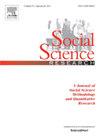Be true to your school: School profiling and school sorting by socio-economic status
IF 3.5
2区 社会学
Q1 SOCIOLOGY
引用次数: 0
Abstract
Many national education systems have schools that adopt distinctive elements like alternative pedagogical concepts or specialty themes. This “school profiling” is suggested to drive school segregation by socio-economic status (SES). Since most existing research has focused on U.S. charter schools and lacks large-scale student-level data, the connection between profiling and SES-based school sorting remains unclear. This study addresses this gap by focusing on the case of the Netherlands, a country known for its high school autonomy and freedom of school choice. I use population-wide register data from over 110,000 students (aged 11–12), linked to novel data on school profiling. The findings reveal social stratification in access to schools with distinctive profiles, with higher-SES students having access to a more diverse pool of schools. Furthermore, conditional logit models show evidence of self-sorting by SES for some profiles: for instance, schools with progressive learning concepts are less popular among lower-SES students, while higher-SES students are comparatively less likely to choose labor market-themed schools. These SES disparities, however, are modest and not always in the expected direction. Overall, findings underscore the role of access disparities in shaping SES-based sorting, next to differential preferences for schooling.
忠于你的学校:学校概况和学校的社会经济地位排序
许多国家的教育体系都有采用独特元素的学校,比如另类的教学理念或专业主题。这种“学校概况”被认为是由社会经济地位(SES)驱动的学校隔离。由于大多数现有的研究都集中在美国的特许学校,缺乏大规模的学生水平的数据,所以分析和基于ses的学校分类之间的联系仍然不清楚。这项研究通过关注荷兰的案例来解决这一差距,荷兰以其高中自治和学校选择自由而闻名。我使用了来自11万多名学生(11-12岁)的全民登记数据,这些数据与学校概况的新数据相关联。研究结果揭示了在进入不同学校方面的社会分层,经济地位较高的学生可以进入更多样化的学校。此外,条件logit模型显示了社会经济地位对某些概况的自我排序证据:例如,具有渐进式学习理念的学校在低社会经济地位的学生中不太受欢迎,而高社会经济地位的学生相对不太可能选择劳动力市场主题的学校。然而,这些社会地位差异并不大,而且并不总是在预期的方向上。总体而言,研究结果强调了教育机会差异在形成基于社会经济能力的分类方面的作用,其次是学校教育偏好的差异。
本文章由计算机程序翻译,如有差异,请以英文原文为准。
求助全文
约1分钟内获得全文
求助全文
来源期刊

Social Science Research
SOCIOLOGY-
CiteScore
4.30
自引率
4.00%
发文量
0
审稿时长
65 days
期刊介绍:
Social Science Research publishes papers devoted to quantitative social science research and methodology. The journal features articles that illustrate the use of quantitative methods in the empirical solution of substantive problems, and emphasizes those concerned with issues or methods that cut across traditional disciplinary lines. Special attention is given to methods that have been used by only one particular social science discipline, but that may have application to a broader range of areas.
 求助内容:
求助内容: 应助结果提醒方式:
应助结果提醒方式:


